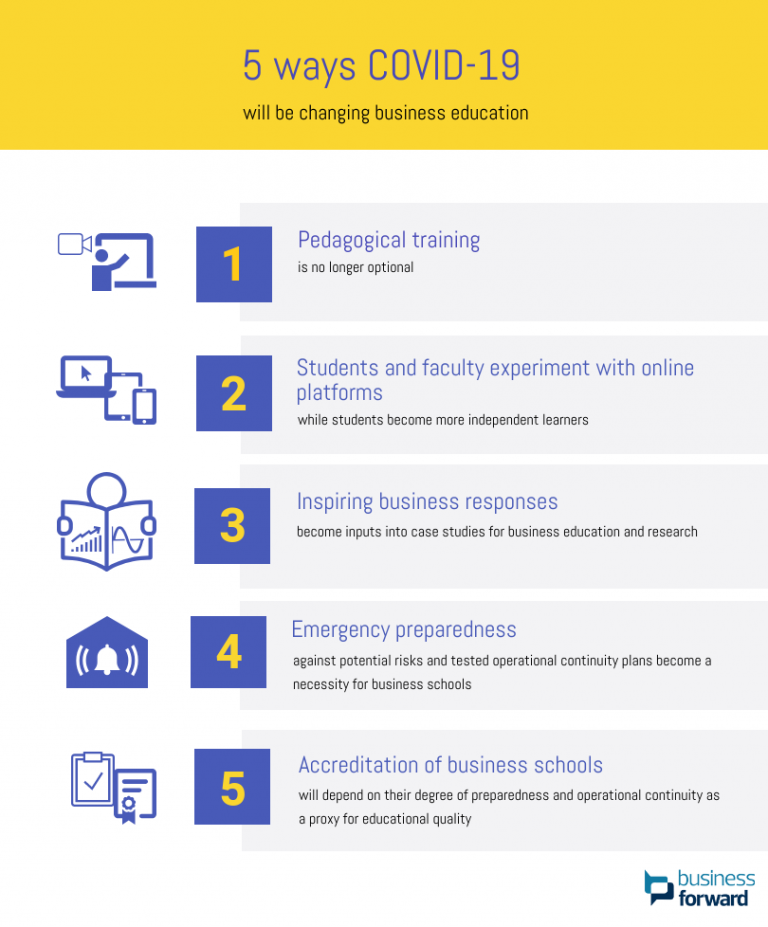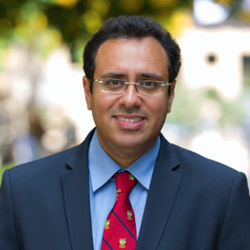
by Ahmed Abdel-Meguid
Associate Dean, Undergraduate Studies and Administration, Associate Professor, School of Business, American University in Cairo, Egypt
11 May 2020
Share:
The COVID-19 outbreak is having profound effects on every single person on the planet. Of course the harshly-felt health, safety, economic and mobility drawbacks of this pandemic are at the forefront. However, this unprecedented disaster is also triggering outcomes that are causing all types of institutions to rethink their modes of operation and even their strategies. Well-established business beliefs about travel, supply chains, healthcare, communications and many other areas have been shattered by this global disruption. Business education is no exception; B-Schools have been caught off guard with varying degrees of defensive preparedness. Many are improvising while banking on some of their already established models; others are already feeling the pain of having less agile tools. Understandably, everyone is currently in the reactive and fire-fighting mode. Once the effects of this pandemic begin to dissipate, an inclusive and very candid conversation should take place within the business education ecosystem. This would include B-Schools, accrediting bodies, ranking agencies, employers and other stakeholders. The core of this discussion would be one thing; how to stay prepared and how to remain relevant. While scenarios remain fluid, five main effects are expected.

1 – Faculty will be become more engaged in continuous pedagogical training
Faculty should be perpetual learners who continuously update their technical knowledge and pedagogical approaches in the classroom. When it comes to the latter [pedagogical approaches], it hasn’t always been easy for instructors to get out of their comfort zone, especially when business as usual has been working well for them. Nevertheless, under normal circumstances some faculty would consider revising their teaching methodologies, typically after attending a teaching workshop of some sort. Out of those even fewer would actually implement the change. The current events resulted in a forced, abrupt, and complete switch to online teaching. This new approach will be added to the teaching toolbox of the majority of faculty worldwide. Faculty got a major nudge to make this mandatory leap, some with more conviction than others. Not only did this result in probably the largest faculty training exercise ever, but faculty skills were also honed by real-time experiential learning in their now virtual classrooms. The increased appetite for further development is expected to have some inertia and continue post-COVID-19.
2 – Students will revisit their perceptions of learning
Like most faculty, the vast majority of students are being exposed to this new educational model. At this point students might have mixed feelings regarding online learning. How they are seeing it depends on the student’s discipline, their personal preferences, first impressions about this model, and the platforms used. However, in general, the prolonged use of online teaching is expected to make students more independent learners. Overall the current setup provides an excellent ‘sand box’ to experiment with new ideas and solicit realistic feedback from students regarding online teaching approaches and online platforms. This will serve as an invaluable source of information for faculty, program directors, and software developers.
Once the effects of this pandemic begin to dissipate, an inclusive and very candid conversation should take place within the business education ecosystem.
3 – Businesses will provide stories to develop a wealth of interesting research and teaching material
The best empirical research, policy briefs, and teaching cases were based on major shocks to the business community. From the 1982 Johnson & Johnson Tylenol- cyanide tampering, to the 2001 Enron-Arthur Andersen financial reporting debacle, to the 2008 global financial crisis, just to mention a few. Of course all these had devastating effects on people, businesses, and countries. However, after the dust settled, these terrible events became the raw material for excellent research and teaching output used in top business schools. Beyond the grim aspects of the current pandemic, we are already seeing unprecedented business agility and innovation. Louis Vuitton is shifting from manufacturing high end fragrances to much needed hand sanitizers free of charge to French health authorities. American Gap and Eddie Bauer are producing masks and gowns for medical personnel, a Belgian hospital is converting scuba diving masks to respirators, and an Italian startup is using 3D-printing to manufacture respirator parts. Tens of stories like these will ultimately be transformed to case studies and papers that will be the focus of courses and research seminars, inspiring thousands of business school learners in undergraduate, MBA, and executive education programs.
4 – Business schools will develop more elaborate preparedness and operational continuity plans
Most academic institutions worldwide conduct regular fire drills and other emergency evacuation plans as part of their standard preparedness measures. However, this pandemic is uncharted waters. B-Schools will probably have to develop or revise their risk assessment process including setting contingency plans in case of a complete physical shutdown like the one on hand. These plans have to be tested by simulated scenarios, with every team in the different functional areas knowing what they need to do, how to do it, and when to do it, to ensure operational continuity with minimum overlap and redundancy. Finally, the effectiveness of communication channels will be reassessed to ensure that the right messages gets to the right people as timely and clearly as possible.
5 – Accreditors and ranking institutions will now see preparedness as a cornerstone of education quality
Since the start of the outbreak, members of accrediting bodies, ranking agencies, and other B-Schools associations have been sharing experiences and best practices in response to this educational disruption. Collectively these international bodies are providing a collaborative platform of knowledge and solidarity, both which are much needed during these difficult times. Beyond this, an important role is expected out of the accreditation and ranking community in bringing preparedness of B-Schools to the forefront of their assessment criteria as a proxy of quality. This will be based on the premise that the degree of ‘excellence’ of a school per the typical quality standards will be enforced or diluted by its degree of operational continuity. In other words, the best B-School which is non-operational would be considered a completely irrelevant player in the ecosystem.
While health experts and mathematical modelers weigh in regarding infection and mortality rates, peaks and flattening of the curve, everyone is just hopeful that we get to the other side of this dark tunnel as soon as possible. There is still a silver lining to all this for B-Schools. The COVID-19 experience is expected to make schools and all their constituents much more flexible, innovative, and collaborative. The experience will also highlight the critical importance of dialogue with the job market concerning the future of work and will accelerate and re-calibrate program-revamping efforts in pursuit of new skill sets in graduates. Furthermore, the gravity of this pandemic on people will ‘humanize’ B-Schools in terms of further bringing society in their crosshairs when it comes to the research agenda, teaching curricula, and outreach. Finally, as the saying goes ‘What Doesn’t Kill You Makes You Stronger’; as vaccines are developed and antibodies are extracted for patients, the business education ecosystem is also developing its own immune system. It will emerge stronger, more prepared, more immune to future disruptions, and above all more relevant.
Originally published on the Business Forward, the AUC School of Business knowledge portal and re-published on the EFMD blog platform.

Ahmed Abdel-Meguid is a tenured associate professor of accounting and associate dean for undergraduate studies and administration at The American University in Cairo (AUC) School of Business – a Triple Crown school (AACSB, EQUIS, and AMBA) where he teaches financial accounting and auditing courses. His research focuses on auditing, audit quality, auditor’s industry specialization, corporate governance, and earnings quality.

